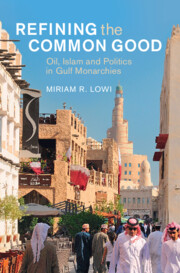Book contents
- Refining the Common Good
- Cambridge Middle East Studies
- Refining the Common Good
- Copyright page
- Dedication
- Contents
- Tables
- Acknowledgments
- Note on Transliteration
- Map of Gulf Monarchies and Neighboring States
- 1 Oil and Islam in the Gulf
- 2 Islamic Norms, Interpretations, Applications
- 3 The State and the Political Economy of Distribution
- 4 Society Responds
- 5 Imported Labor
- 6 Charity as Politics “Writ Small”
- 7 Islamic Banking and Finance
- 8 Reflections on Islam and Politics in the Oil Era
- Appendix
- Bibliography
- Index
- Series page
4 - Society Responds
Published online by Cambridge University Press: 08 November 2024
- Refining the Common Good
- Cambridge Middle East Studies
- Refining the Common Good
- Copyright page
- Dedication
- Contents
- Tables
- Acknowledgments
- Note on Transliteration
- Map of Gulf Monarchies and Neighboring States
- 1 Oil and Islam in the Gulf
- 2 Islamic Norms, Interpretations, Applications
- 3 The State and the Political Economy of Distribution
- 4 Society Responds
- 5 Imported Labor
- 6 Charity as Politics “Writ Small”
- 7 Islamic Banking and Finance
- 8 Reflections on Islam and Politics in the Oil Era
- Appendix
- Bibliography
- Index
- Series page
Summary
I consider how Gulf Arabs evaluate their government’s behavior relative to the circulation of wealth. On the basis of roughly 350 interviews in the four countries with scholars, economists, dissidents, bankers, members of government, representatives of public and private foundations and NGOs and official and independent ‘ulama, I summarize their views, quoting from their responses to a set of questions and sharing the evidence they provide. I note the extent to which my interlocutors criticize their rulers in ethical terms, especially insofar as their commitment to social justice, equity and inclusion is concerned. In short, they confirm that there is no genuine concern for equity in the distribution of resources, and no indication that religious norms are integrated into this domain of governance. Rather, fairly narrow political and material interests prevail. Then, I briefly describe episodes of resistance to Gulf rulers from religious forces in society. The aim is twofold: to demonstrate how they too instrumentalize Islam for political capital and how rulers respond to the challenge they face from the religious field.
- Type
- Chapter
- Information
- Refining the Common GoodOil, Islam and Politics in Gulf Monarchies, pp. 74 - 87Publisher: Cambridge University PressPrint publication year: 2024

